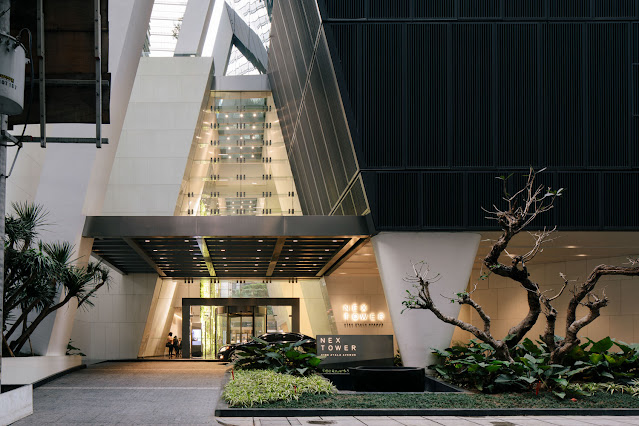Gold Standard
March 29, 2022Prior to the pandemic, buildings and building constructions reached an all-time high in carbon emissions. The UNEP stated the sector has accounted for 38% of all energy- related CO2 emissions in 2019. To be on track to achieving a net-zero carbon building stock by 2050, the International Energy Agency recommends that building sector emissions should be reduced by around 6% annually from 2020 to 2030. A lot of this change will be propelled by shifting to renewable energy sources and increasing resource efficiency (meaning doing more with one unit whether it is kilowatt-hour or cubic meter).
For Menarco Development Corporation’s Carmen Jimenez-Ong and Nova Group’s Chut
Cuerva, this means making a single drop of water go through their buildings multiple
times before it is discharged. Nova’s Nex Tower in Ayala Avenue is Leadership in
Energy and Environmental Design (LEED) Platinum certified and is the sole Philippine
project to ever bag Urban Land Institute’s Asia Pacific Award for Excellence.
Meanwhile, Menarco Tower in Bonifacio Global City is the first to pursue WELL
certification in the country, and the only building in Asia to be both LEED Gold and
WELL Gold certified.
Menarco Tower has reduced potable water use by 47.49%. Potable water for sewage
conveyance is reduced by 100%. Landscaping and irrigation systems in Menarco have
been designed to use only recycled water. Instead of using clean, potable water to do
things that do not require potable water that people should be drinking, a gray water
system filters water from the condensate drains and water used for washing, plows it
back into the system to water the plants. Nex Tower uses the same principles. Instead
of water from the mains, a rainwater harvesting system collects rain that falls on the roof
and filters it to irrigate the plants.
“It comes from a philosophy of treating water like gold, saving it when and where you
can,” says Jimenez-Ong.
“You wouldn’t think there’d be water shortages when it rains like crazy here. But what
we are trying to do is store the water. When there is plenty of water, you can store that
so when there is no water, you use that. It’s a similar predicament to solar panels. When
it is sunny, you want to store that energy in a battery and then use it when the rates are
expensive,” says Cuerva.
The other benefit of storing water is that during huge downpours, it helps the sewerage
systems. If more buildings like Nex and Menarco capture rain during these downpours,
then slowly releasing the excess into the sewerage systems instead of dumping it all at
one time, they would help ease flooding in our cities.
Another piece of the water conservation strategy is selecting the correct bathroom
fixtures. Faucets in older buildings are usually left running because people forget or they
are not closed properly. “By using a sensor, the person using the faucet does not have
to worry about that, and we don’t have to police that. Same thing with the toilets and the
urinals, they have auto flush, so a toilet or urinal will calculate how long you are sitting
there and use the right amount of water to flush. So that’s the approach we took. By
choosing the right fixtures, we are saving 46 percent more water than your standard
building,” says Cuerva.
For Jimenez-Ong, educating onboarding tenants on how to properly use the building
amenities was crucial. It keeps operations sustainable and reduces maintenance costs.
“Menarco is my only baby. So, come, you are welcome to enjoy it, but let’s learn how to
use it. We have a video. We have written forms, almost like a test, just so we know that
they know. We do this prior to issuing you an RFID. I don’t want to hear it that you
flushed something that clogged our system because you didn’t know.”
“What I was hoping for are things from groups like LIXIL to help us figure out how to be
more efficient in conserving not just water that we see but also water that we don’t see,”
she adds.
Pioneering water products manufacturer LIXIL, whose portfolio includes INAX, GROHE
and American Standard, has been rallying its R&D around environmental sustainability
and recently met some milestones. “I think that's the biggest investment LIXIL has made
to get people fully committed to the cause,” LIXIL’s Corporate Responsibility Lead
Priyanka Tanwar.
GROHE’s Sense and Sense Guard water monitoring systems alert homeowners of pipe
leaks so they can be addressed immediately. The app monitors and reports
consumption so people can adjust their water use. Moreover, all of GROHE’s products
are produced in carbon-neutral plants and a series of fixtures have recently been
certified Cradle-to-Cradle Gold.Products like Amercian Standard’s Genie can save up to
35% of water with every single use. Aqua Ceramic ensures that your products stay
clean and therefore lessens amount of water is used in maintenance.
The United Nations reports that 2.3 billion people now live in water-stressed countries.
At least 1.42 billion people, including 450 million children, live in water vulnerable areas.
By 2030, 700 million people worldwide could be displaced by intense water scarcity.
“When you read facts like this, the little things we do translate over time and really help
people. We are all connected,” says Jimenez Ong.
A drop of water, a minute or electricity, a single degree in global temperature change—it
all adds up. Moreover, the climate does not recognize territorial jurisdictions. What
Philippine developers do here and now, and what big global companies like LIXIL does
in their factories all over the world sends ripples of change across borders and
generations. Indeed, we are all connected.



0 Comments